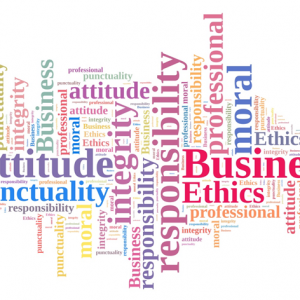Eine verantwortliche Führungskraft (= „responsible leader“) zeichnet sich dadurch aus, dass sie für die Folgen ihres Handelns vor unterschiedlichen Instanzen (wie den Aktionären, Kunden, Lieferanten, der Öffentlichkeit und anderen Anspruchsgruppen) Rede und Antwort stehen können.
Das ist leichter gesagt als getan. Matthias Müller, der derzeitige CEO der Volkswagengruppe, antwortete kürzlich auf die Frage amerikanischer Journalisten, wie er das mit dem Abgasskandal verbundene „ethische Problem“ ändern wolle:
„Frankly spoken, it was a technical problem. We made a default, we had a … not the right interpretation of the American law. And we had some targets for our technical engineers, and they solved this problem and reached targets with some software solutions which haven’t been compatible to the American law. That is the thing. And the other question you mentioned — it was an ethical problem? I cannot understand why you say that.“
Auch in einer Nachbesserung seines Interviews vermochte Müller nicht, auf den Vorwurf eines ethischen Problems einzugehen. Offensichtlich verstand er nicht, was damit gemeint ist. Stattdessen sah er die Ursache für die technischen Probleme alleine in den von VW missverstandenen US-Gesetzen.
Müllers Unverständnis für ethische Probleme ist leider ein weit verbreitetes Phänomen – auch unter Top-Managern. Was heisst Ethik überhaupt? Gemäss einer einfachen Definition handelt sie vom guten Miteinanderauskommen. Mit wem sollten Firmen und deren Führungskräfte gut auskommen? Offensichtlich nicht allein mit den Aktionären, sondern mit allen anderen Gruppen, die von den Aktivitäten eines Unternehmens betroffen sind – in unserem Beispiel wenigstens alle VW-Kunden, die im guten Glauben, ein abgasarmes Auto erworben zu haben, sich nun getäuscht sehen. Für sie hat das Unternehmen unethisch gehandelt. Mit spitzfindigen Entschuldigungen sehen sie sich darin nur noch mehr bestärkt.
Wer das amerikanische Rechtssystem kennt, weiss, dass solches Verhalten die zu erwartenden Strafzahlungen erheblich in die Höhe treiben kann. Es wäre also schon aus ökonomischen Gründen besser, sich der ethischen Verantwortung zu stellen und das gute Auskommen mit allen Betroffenen möglichst schnell wiederherzustellen. Ohne einen Dialog, der die Bedenken aller ernst nimmt, wird dies kaum gelingen.
—————————————————————————————————————————————–
How leaders take (not) on responsibility towards the public!
A responsible leader has the capability to justify the consequences of her/ his activities towards different authorities such as shareholders, customers, suppliers, the public and other interest groups.
It is much easier to proclaim this than to act accordingly. Matthias Müller, the present CEO of Volkswagen, recently responded to the question of an American journalist, how he would like to change the “ethical problem” connected with the Emission-Scandal:
„Frankly spoken, it was a technical problem. We made a default, we had a … not the right interpretation of the American law. And we had some targets for our technical engineers, and they solved this problem and reached targets with some software solutions which haven’t been compatible to the American law. That is the thing. And the other question you mentioned — it was an ethical problem? I cannot understand why you say that.“
Even one day later, in an improved version of his interview, Müller was not able to respond to the blame of an ethical problem adequately. Obviously, he did not understand what is meant by the term “ethical”. In contrary, he saw the reason of the technical problems in misunderstood US-laws.
Müller’s lack of understanding ethical issues is a widely spread phenomenon even within top-management. What do ethics mean? According to a simple definition, ethics deal with the “getting along well with each other”. But, with whom should firms and leaders get along well? Obviously, they should get along well not only with the shareholders, but also with all groups concerned by their activities – in our example at least with all VW customers who bought an environmentally friendly car, and now, see themselves cheated. For them, VW has acted unethically. With hair-splitting excuses, they see reinforced in their opinion.
Such behavior might lead to a significant increase of the expected punitive damages. Consequently, it is economically reasonable to take on ethical responsibility and to get along better with all concerned as quickly as possible. This might be impossible without a dialogue, which takes all concerns seriously.
